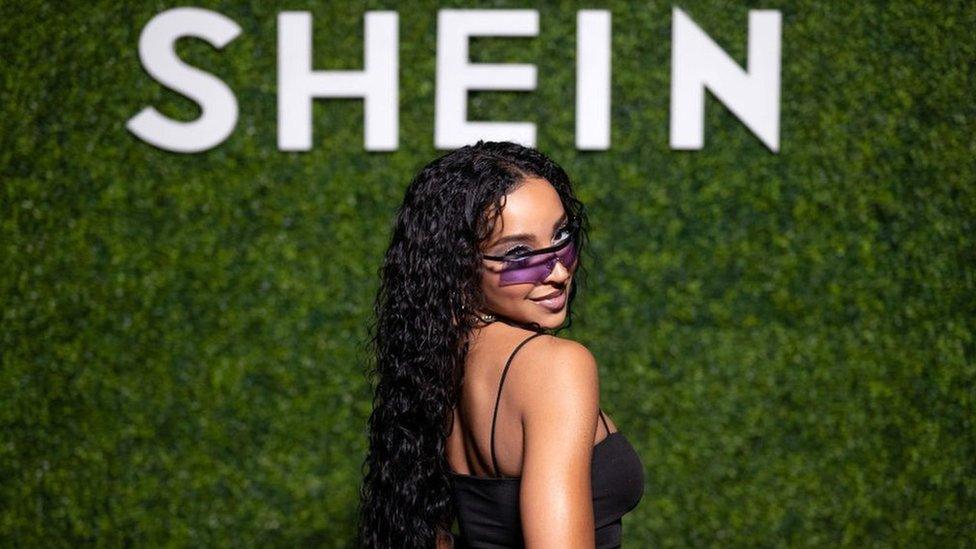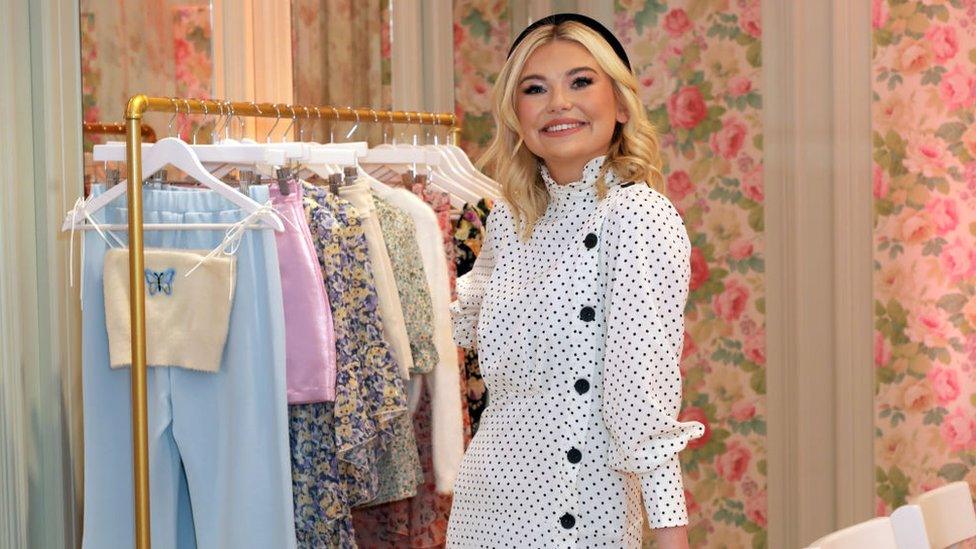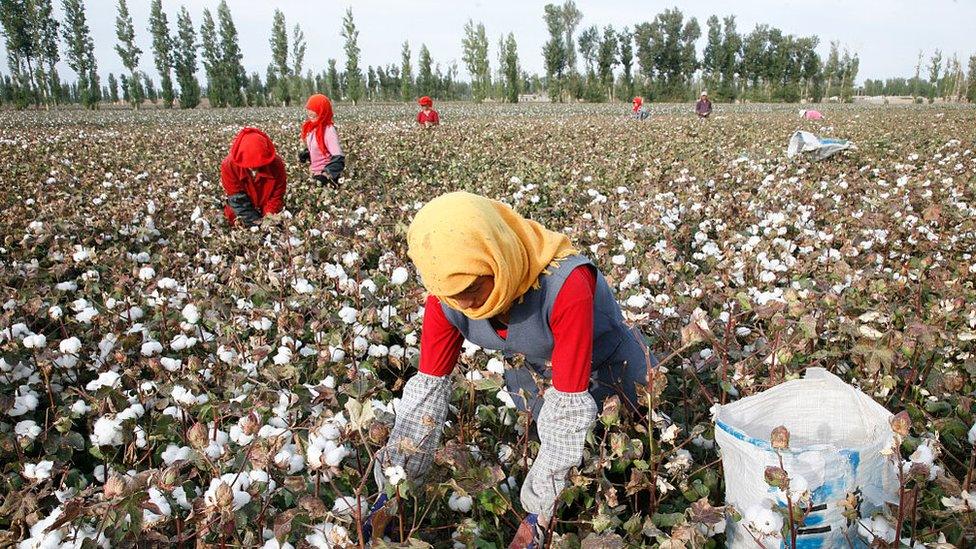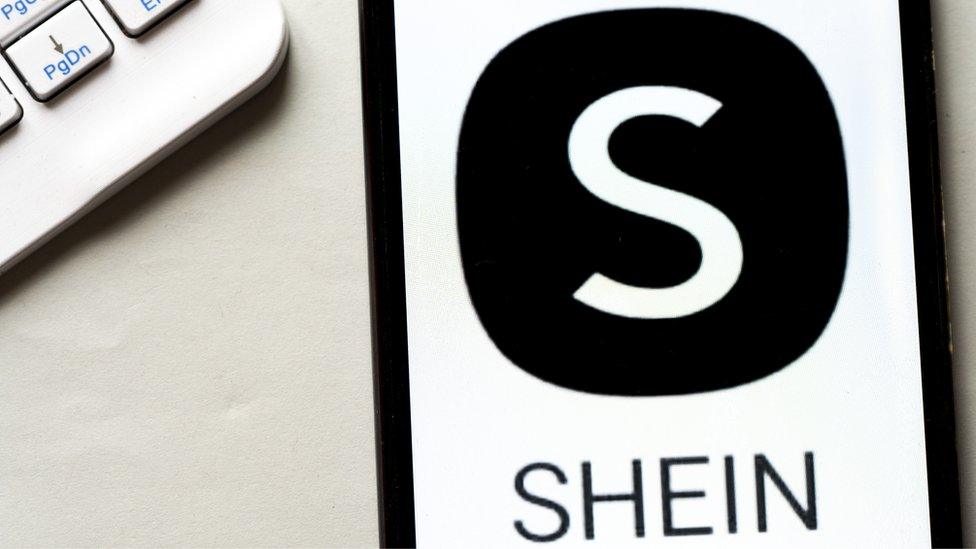Shein: China fashion giant investigates 'false' anti-Uyghur job ads
- Published

Celebrities including Tinashe, Katy Perry and Hailey Bieber have worked with Shein
Chinese fast fashion firm Shein has launched an investigation into "false" discriminatory job adverts posted on recruitment sites under its name.
Adverts seen by the BBC for factory and warehouse workers said those from certain ethnic minority backgrounds, including Uyghurs, must not apply.
Shein said it did not fund or approve the ads, and it was committed to "upholding high labour standards".
The plight of the Uyghurs in China has sparked international condemnation.
Fast-growing Shein competes with the likes of Boohoo in the market for young shoppers and has collaborated with celebrities and influencers to build its online following.
Several adverts were posted under Shein's name between April and December of 2020 on Chinese recruitment websites.
They offered jobs working in its Guangzhou factories or warehouses earning about 16 yuan (£1.81) per hour, as well as saying workers did not need to get tested for Covid - or pass a medical exam to work on-site - at the height of the pandemic.
A Shein spokesperson said the company was "surprised and concerned" to see the adverts using language that "goes against" its hiring principles.
"Shein is fully committed to upholding high labour standards across our entire supply chain and to improving the lives of workers in the global supply chain by supporting national and international efforts to end forced labour," they said, adding it has strict requirements for its suppliers and does not tolerate discrimination.
Its recruitment company, Guangzhou Zhongzhi Human Resources Management, also said it would "investigate the individuals who fraudulently used our company's name to release false information" and hold them "accountable to the fullest extent of the law".
"We sincerely apologise for the impact this incident had on Shein and related applicants due to our company's negligence," it said in a letter.

A fast fashion firm taking TikTok by storm
£5 tops, £10 midi skirts - and even a £30 wedding dress.
Shein is winning over young shoppers in the US, UK and Europe by producing fast fashion even faster, and often at cheaper prices, than many of its rivals such as Boohoo or Asos.
Founded in 2008, Shein reportedly relies on thousands of third-party suppliers in China to produce batches of clothes, which it orders again if they perform well with customers.

Georgia Toffolo and other British influencers have collaborated on clothing lines with the fast fashion firm
Odds are if you're over the age of 30, you might not have heard of the Chinese company.
But on Instagram and TikTok, it's hard to escape videos of Shein "hauls", where users try on and review different outfits by the brand.
Using an army of influencers, from student "campus ambassadors" to reality stars such as Made in Chelsea's Georgia Toffolo or Amber Turner from The Only Way Is Essex, it has amassed more than 24 million followers.
"For a retailer without physical stores and a company that is virtually unknown to anyone but their target audience, Shein has utilised social media to reach consumers directly and become arguably the biggest digital clothing retailer," said Juozas Kaziukėnas, founder of research firm Marketplace Pulse.
Its meteoric rise has not been without problems, though.
The private company has not disclosed financial figures and has been criticised for selling items such as a Muslim prayer mat described as a "Greek carpet", which it was forced to withdraw.
It has also been accused of copyright infringement and faces lawsuits from the likes of the maker of Dr Martens boots, although the e-retailer denies any wrongdoing and a hearing is scheduled later this year.

The prices for Shein's on-trend fashion items have sparked concerns online about sustainability and its labour practices.
Its website previously stated that Shein was "proudly in compliance with strict fair labour standards set by international organisations like SA8000".
The SA8000 certification is issued to companies who have their performance measured in areas such as forced and child labour, health and safety and working hours.
But Social Accountability International (SAI), which created the standard, told the BBC in June that Shein was not certified and never had been to its knowledge.
"Companies sometimes reference SA8000 in their advertising if they use SA8000 principles in their internal social compliance programs or if they source from SA8000-certified facilities," an SA8000 spokesperson said.
"As long as a company does not claim to be certified and does not mention the SA8000 disingenuously, we do not consider it a violation to refer to the SA8000 Standard principles in this way."
The reference on Shein's website has since been removed.

It is alleged that Uyghur people are forced to pick cotton that supplies the global market
The discriminatory job adverts described as false by Shein were shared with the BBC by the Coalition to End Uyghur Forced Labour.
"What is really important is to be able to distinguish between those companies that are actually taking meaningful steps to respect the workers in their supply chains and those that are failing to do so," said Chloe Cranston, business and human rights manager at Anti-Slavery International, which forms part of the coalition.
In recent months, several big brands have come under scrutiny due to their activities in China's Xinjiang region.
French prosecutors announced in July they were looking into accusations that Zara-owner Inditex, Uniqlo, SMCP and Skechers sourced goods made by forced labour from Uyghur Muslims in China.
Skechers declined to comment, while the other three firms denied the claims.
The Xinjiang region produces 85% of China's cotton and accounts for about a fifth of global supplies.
Related topics
- Published6 July 2020

- Published12 August 2021
